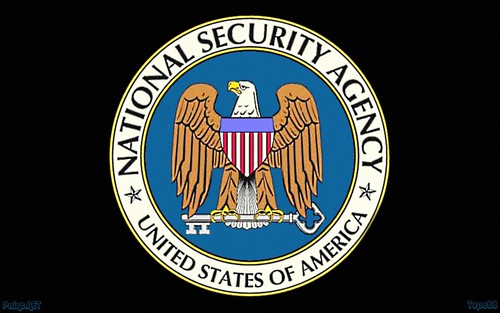
National Security Agency emblem. The NSA has been exposed again for massive spying against people in the United States and the world., a photo by Pan-African News Wire File Photos on Flickr.
Hong Kong to Handle NSA Leaker Extradition Based on Law
By Lisa Lerer and Hwee Ann Tan - Jun 12, 2013
Hong Kong will deal with any U.S. extradition request for a former National Security Agency contractor who disclosed secret information, based on the city’s legal system, Chief Executive Leung Chun-ying said.
“We can’t comment on individual cases,” Leung said yesterday in a Bloomberg Television interview in New York. “We’ll handle the case according to our law.”
As the U.S. Justice Department worked on possible charges, Edward Snowden, who disclosed details of U.S. surveillance programs, vowed to fight extradition from Hong Kong, where he fled before revealing his identity. In an interview published yesterday by the South China Morning Post, he said he hadn’t committed any crime.
“I’m neither traitor nor hero,” Snowden said. “I’m an American.”
The South China Morning Post said Snowden was interviewed in a secret location after he checked out of a Hong Kong hotel on June 10. Asked about his decision to flee to Hong Kong, a semi-autonomous region of China that maintains a Western-style legal system, Snowden said: “People who think I made a mistake in picking Hong Kong as a location misunderstand my intentions. I am not here to hide from justice; I am here to reveal criminality.”
Should Snowden be charged or indicted, the U.S. would be required to present probable cause to Hong Kong authorities. As part of a 1996 treaty, the State Department would then make a formal extradition request to the territory. Hong Kong officials would decide whether to extradite Snowden, according to the treaty.
Criminal Investigation
U.S. officials have refused to say whether they know Snowden’s location or discuss what charges may be brought against him, citing the investigation into leaking of information about the federal government’s sweep of telephone and Internet data under a law passed after the Sept. 11, 2001, terrorist attacks.
Snowden’s disclosures, made to the U.K.’s Guardian newspaper and the Washington Post, have triggered a criminal investigation by the Justice Department, calls for the surveillance to be limited, and a lawsuit accusing the government of violating the privacy and free-speech rights of its citizens.
As he spoke to the media, lawmakers on Capitol Hill braced for possible further disclosures of U.S. intelligence secrets, after receiving classified briefings about the programs yesterday from FBI, legal and intelligence officials.
Saxby Chambliss of Georgia, the top Republican on the Senate Intelligence Committee, said he expects Snowden to release more classified data.
Thumb Drive
“Apparently he’s got a thumb drive,” Chambliss said, though its contents are unknown. “He’s already exposed part of it and I guess he’s going to expose the rest of it.”
While no direct mention was made of additional leaks in the Morning Post interview, Snowden alleged that the U.S. is trying to “bully” Hong Kong’s government into extraditing him “before the local government can learn of this.”
Snowden, 29, a former national security contractor and technical assistant for the Central Intelligence Agency, identified himself as the source of reports in the Guardian and the Washington Post about the program run by the National Security Agency. He arrived in Hong Kong from his home in Hawaii on May 20, after taking leave from his contractor position at Booz Allen Hamilton Holding Corp. (BAH), according to the Guardian.
Snowden worked at the NSA for the past four years with government contracting companies after a stint with the CIA. He most recently worked for several months at Booz Allen, which has announced yesterday that he was fired from his $122,000 a year job working with the NSA.
Access Questions
Several U.S. lawmakers said they wanted to find out how Snowden got access to the classified information, including an order from the special court that reviews requests under the Foreign Intelligence Surveillance Act that few top government officials are allowed to see.
Robert Menendez, a New Jersey Democrat and chairman of the Senate Foreign Relations Committee, echoed many other lawmakers when he said in an interview that “the administration should ultimately pursue all the legal avenues they have against him and prosecute him.”
Texas Representative Mike McCaul, the Republican head of the Homeland Security Committee, said the disclosures were “a serious breach of national security law.”
To contact the reporters on this story: Lisa Lerer in Washington at llerer@bloomberg.net; Hwee Ann Tan in Hong Kong at hatan@bloomberg.net
To contact the editors responsible for this story: Mark Silva at msilva34@bloomberg.net; Rosalind Mathieson at rmathieson3@bloomberg.net
No comments:
Post a Comment